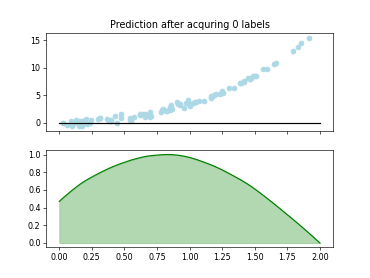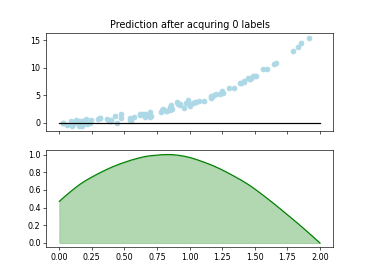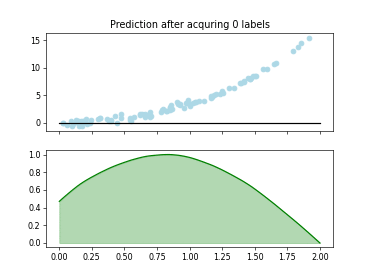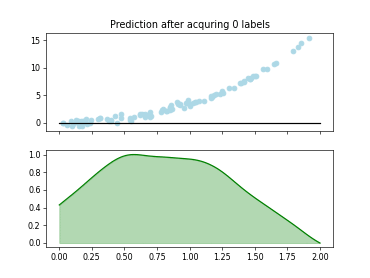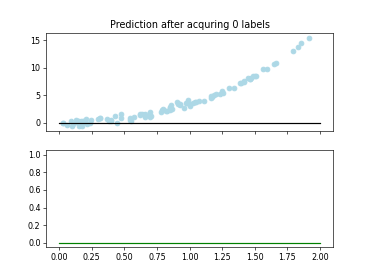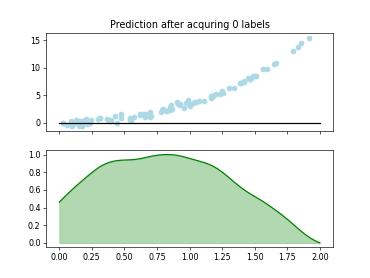skactiveml.base.ProbabilisticRegressor#
- class skactiveml.base.ProbabilisticRegressor(missing_label=nan, random_state=None)[source]#
Bases:
SkactivemlRegressorBase class for scikit-activeml probabilistic regressors.
Methods
fit(X, y[, sample_weight])Fit the model using X as training data and y as numerical labels.
Get metadata routing of this object.
get_params([deep])Get parameters for this estimator.
predict(X[, return_std, return_entropy])Returns the mean, std (optional) and differential entropy (optional) of the predicted target distribution conditioned on the test samples X.
Returns the predicted target distribution conditioned on the test samples X.
sample_y(X[, n_samples, random_state])Returns random samples from the predicted target distribution conditioned on the test samples X.
score(X, y[, sample_weight])Return the coefficient of determination of the prediction.
set_fit_request(*[, sample_weight])Request metadata passed to the
fitmethod.set_params(**params)Set the parameters of this estimator.
set_predict_request(*[, return_entropy, ...])Request metadata passed to the
predictmethod.set_score_request(*[, sample_weight])Request metadata passed to the
scoremethod.- abstract fit(X, y, sample_weight=None)#
Fit the model using X as training data and y as numerical labels.
- Parameters
- Xmatrix-like, shape (n_samples, n_features)
The sample matrix X is the feature matrix representing the samples.
- yarray-like, shape (n_samples) or (n_samples, n_targets)
It contains the labels of the training samples. The number of numerical labels may be variable for the samples, where missing labels are represented the attribute ‘missing_label’.
- sample_weightarray-like, shape (n_samples)
It contains the weights of the training samples’ values.
- Returns
- self: skactiveml.base.SkactivemlRegressor,
The skactiveml.base.SkactivemlRegressor object fitted on the training data.
- get_metadata_routing()#
Get metadata routing of this object.
Please check User Guide on how the routing mechanism works.
- Returns
- routingMetadataRequest
A
MetadataRequestencapsulating routing information.
- get_params(deep=True)#
Get parameters for this estimator.
- Parameters
- deepbool, default=True
If True, will return the parameters for this estimator and contained subobjects that are estimators.
- Returns
- paramsdict
Parameter names mapped to their values.
- predict(X, return_std=False, return_entropy=False)[source]#
Returns the mean, std (optional) and differential entropy (optional) of the predicted target distribution conditioned on the test samples X.
- Parameters
- Xarray-like, shape (n_samples, n_features)
Input samples.
- return_stdbool, optional (default=False)
Whether to return the standard deviation.
- return_entropybool, optional (default=False)
Whether to return the differential entropy.
- Returns
- munumpy.ndarray, shape (n_samples)
Predicted mean conditioned on X.
- stdnumpy.ndarray, shape (n_samples), optional
Predicted standard deviation conditioned on X.
- entropynumpy..ndarray, optional
Predicted differential entropy conditioned on X.
- abstract predict_target_distribution(X)[source]#
Returns the predicted target distribution conditioned on the test samples X.
- Parameters
- Xarray-like, shape (n_samples, n_features)
Input samples.
- Returns
- distscipy.stats._distn_infrastructure.rv_frozen
The distribution of the targets at the test samples.
- sample_y(X, n_samples=1, random_state=None)[source]#
Returns random samples from the predicted target distribution conditioned on the test samples X.
- Parameters
- Xarray-like, shape (n_samples_X, n_features)
Input samples, where the target values are drawn from.
- n_samples: int, optional (default=1)
Number of random samples to be drawn.
- random_stateint, RandomState instance or None, optional
- (default=None)
Determines random number generation to randomly draw samples. Pass an int for reproducible results across multiple method calls.
- Returns
- y_samplesnumpy.ndarray, shape (n_samples_X, n_samples)
Drawn random target samples.
- score(X, y, sample_weight=None)#
Return the coefficient of determination of the prediction.
The coefficient of determination \(R^2\) is defined as \((1 - \frac{u}{v})\), where \(u\) is the residual sum of squares
((y_true - y_pred)** 2).sum()and \(v\) is the total sum of squares((y_true - y_true.mean()) ** 2).sum(). The best possible score is 1.0 and it can be negative (because the model can be arbitrarily worse). A constant model that always predicts the expected value of y, disregarding the input features, would get a \(R^2\) score of 0.0.- Parameters
- Xarray-like of shape (n_samples, n_features)
Test samples. For some estimators this may be a precomputed kernel matrix or a list of generic objects instead with shape
(n_samples, n_samples_fitted), wheren_samples_fittedis the number of samples used in the fitting for the estimator.- yarray-like of shape (n_samples,) or (n_samples, n_outputs)
True values for X.
- sample_weightarray-like of shape (n_samples,), default=None
Sample weights.
- Returns
- scorefloat
\(R^2\) of
self.predict(X)w.r.t. y.
Notes
The \(R^2\) score used when calling
scoreon a regressor usesmultioutput='uniform_average'from version 0.23 to keep consistent with default value ofr2_score(). This influences thescoremethod of all the multioutput regressors (except forMultiOutputRegressor).
- set_fit_request(*, sample_weight: Union[bool, None, str] = '$UNCHANGED$') ProbabilisticRegressor#
Request metadata passed to the
fitmethod.Note that this method is only relevant if
enable_metadata_routing=True(seesklearn.set_config()). Please see User Guide on how the routing mechanism works.The options for each parameter are:
True: metadata is requested, and passed tofitif provided. The request is ignored if metadata is not provided.False: metadata is not requested and the meta-estimator will not pass it tofit.None: metadata is not requested, and the meta-estimator will raise an error if the user provides it.str: metadata should be passed to the meta-estimator with this given alias instead of the original name.
The default (
sklearn.utils.metadata_routing.UNCHANGED) retains the existing request. This allows you to change the request for some parameters and not others.New in version 1.3.
Note
This method is only relevant if this estimator is used as a sub-estimator of a meta-estimator, e.g. used inside a
Pipeline. Otherwise it has no effect.- Parameters
- sample_weightstr, True, False, or None, default=sklearn.utils.metadata_routing.UNCHANGED
Metadata routing for
sample_weightparameter infit.
- Returns
- selfobject
The updated object.
- set_params(**params)#
Set the parameters of this estimator.
The method works on simple estimators as well as on nested objects (such as
Pipeline). The latter have parameters of the form<component>__<parameter>so that it’s possible to update each component of a nested object.- Parameters
- **paramsdict
Estimator parameters.
- Returns
- selfestimator instance
Estimator instance.
- set_predict_request(*, return_entropy: Union[bool, None, str] = '$UNCHANGED$', return_std: Union[bool, None, str] = '$UNCHANGED$') ProbabilisticRegressor#
Request metadata passed to the
predictmethod.Note that this method is only relevant if
enable_metadata_routing=True(seesklearn.set_config()). Please see User Guide on how the routing mechanism works.The options for each parameter are:
True: metadata is requested, and passed topredictif provided. The request is ignored if metadata is not provided.False: metadata is not requested and the meta-estimator will not pass it topredict.None: metadata is not requested, and the meta-estimator will raise an error if the user provides it.str: metadata should be passed to the meta-estimator with this given alias instead of the original name.
The default (
sklearn.utils.metadata_routing.UNCHANGED) retains the existing request. This allows you to change the request for some parameters and not others.New in version 1.3.
Note
This method is only relevant if this estimator is used as a sub-estimator of a meta-estimator, e.g. used inside a
Pipeline. Otherwise it has no effect.- Parameters
- return_entropystr, True, False, or None, default=sklearn.utils.metadata_routing.UNCHANGED
Metadata routing for
return_entropyparameter inpredict.- return_stdstr, True, False, or None, default=sklearn.utils.metadata_routing.UNCHANGED
Metadata routing for
return_stdparameter inpredict.
- Returns
- selfobject
The updated object.
- set_score_request(*, sample_weight: Union[bool, None, str] = '$UNCHANGED$') ProbabilisticRegressor#
Request metadata passed to the
scoremethod.Note that this method is only relevant if
enable_metadata_routing=True(seesklearn.set_config()). Please see User Guide on how the routing mechanism works.The options for each parameter are:
True: metadata is requested, and passed toscoreif provided. The request is ignored if metadata is not provided.False: metadata is not requested and the meta-estimator will not pass it toscore.None: metadata is not requested, and the meta-estimator will raise an error if the user provides it.str: metadata should be passed to the meta-estimator with this given alias instead of the original name.
The default (
sklearn.utils.metadata_routing.UNCHANGED) retains the existing request. This allows you to change the request for some parameters and not others.New in version 1.3.
Note
This method is only relevant if this estimator is used as a sub-estimator of a meta-estimator, e.g. used inside a
Pipeline. Otherwise it has no effect.- Parameters
- sample_weightstr, True, False, or None, default=sklearn.utils.metadata_routing.UNCHANGED
Metadata routing for
sample_weightparameter inscore.
- Returns
- selfobject
The updated object.
Examples using skactiveml.base.ProbabilisticRegressor#
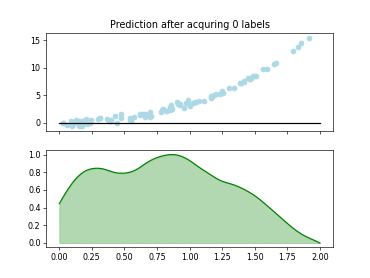
Regression based Kullback Leibler Divergence Maximization
